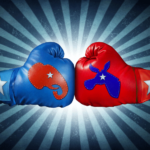The Fourth Democratic Debate: A Look Back
The fourth round of Democratic presidential primary debates took place on October 15 at Otterbein University in Westerville, Ohio, a suburb of Columbus. Twelve candidates participated in the three-hour-long event, which was co-hosted by CNN and the New York Times. In case you missed it, Election Central is here to walk you through the highlights of the evening, as well as give you the important takeaways.
Who Participated?
The cast of the largest presidential debate in history included former Vice President Joe Biden; Sen. Elizabeth Warren (Massachusetts); Sen. Amy Klobuchar (Minnesota); Sen. Cory Booker (New Jersey); Sen. Kamala Harris (California); Sen. Bernie Sanders (Vermont); Mayor Pete Buttigieg (South Bend, Indiana); former Housing and Urban Development Secretary Julian Castro; former Rep. Beto O’Rourke (Texas); Rep. Tulsi Gabbard (Hawaii); billionaire Tom Steyer; and entrepreneur Andrew Yang.
What Were the Highlights?
In recent weeks, Elizabeth Warren’s polling numbers among Democratic voters have caught her up (and in some polls) passed Joe Biden. And so, Warren received more criticism and attacks from the other candidates than in the past debates. In particular, she came under fire for her “Medicare for All” plan. Buttigieg, in particular, suggested that she had no plan in place to pay for it and instead advocated for “Medicare for those who want it.”
Buttigieg himself had a lot of air time at the debate, aggressively going after not just Warren, but also O’Rourke for his statement at a previous debate about taking away people’s AR-15s. O’Rourke also challenged Gabbard for her support of Trump for pulling U.S. troops out of Syria. In fact, Buttigieg’s performance has led many political analysts to wonder if he could have separated himself from the rest of the remaining Democrats, despite polling well behind the top three (Warren, Biden, and Sanders) so far.
Despite the fact that the Trump impeachment inquiry has dominated headlines, and that the inquiry centers around Trump’s attempts to coerce the Ukrainian government into digging up dirt on Joe Biden’s son Hunter, not a lot of debate time was spent on these issues. Biden insisted that he has done nothing wrong and that his son has done nothing wrong, and then the debate moved on to other topics.
After undergoing emergency heart surgery just weeks earlier, many people paid special attention to Sanders–wondering if be was healthy and strong enough to handle his first post-surgery public appearance . . . especially a three-hour debate. But Sanders looked healthy and rested, and was an eager participant in the debate. When asked about his age and health (if elected, he will be 80 when he takes office), Sanders deflected a bit, saying that with age comes wisdom. An interesting note is that all three of the top-polling candidates are currently in their 70s, and among them, Sanders polls the best with young voters.
So Who “Won” and “Lost”?
Of course, political analysts and experts argue about which candidates can best call the debate a victory. Buttigieg and Klobuchar experienced the biggest jump in the polls afterward, though Biden, Sanders, and Warren still remain the leading three candidates.
Sanders ended the night by announcing that he will be receiving the political endorsement and campaign support of Reps. Alexandria Ocasio-Cortez and Ilhan Omar, two members of the so-called “Squad” (the four freshmen female Democratic legislators who have come under fire from Trump).
Warren also had a successful evening, receiving more air time than any other candidate and tirelessly defending her positions and proposals.



